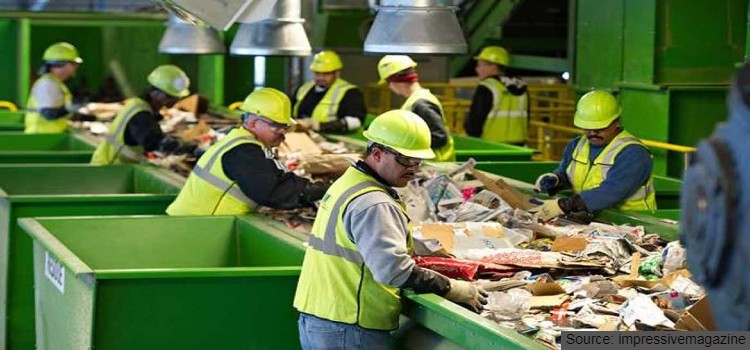
Spain Waste Management Market by Waste Type (Municipal Solid Waste (MSW) or Household, Industrial, and Commercial) and by Waste Treatment (Composting, Incineration, Controlled Landfill, Uncontrolled Landfill, Sanitary Landfill, Open Dump, and Recycling)– Opportunity Analysis and Industry Forecast, 2024 – 2030
Industry: Energy & Power | Publish Date: 08-Oct-2024 | No of Pages: 114 | No. of Tables: 82 | No. of Figures: 47 | Format: PDF | Report Code : EP2741
Spain Waste Management Market Overview
Spain Waste Management Market size was valued at USD 8.13 billion in 2023, and is predicted to reach USD 10.77 billion by 2030, at a CAGR of 3.10% from 2024 to 2030.
Spain waste management market involves a wide range of services and activities aimed at managing and mitigating the impact of waste generated by various sectors including residential, commercial, industrial, and healthcare. It includes the collection, transportation, processing, recycling, and disposal of waste materials in a manner that is environmentally responsible and sustainable. The market also involves the development and implementation of technologies and practices that promote waste reduction, resource recovery, and the safe handling of hazardous materials.
Key components of the waste reduction market include waste collection services, recycling facilities, waste-to-energy plants, landfill operations, and environmental consulting services. As awareness of environmental issues grows, the waste reduction market continues to expand, driven by growing population, technological advancements, and increasing public demand for sustainable waste solutions.
Urban Development in Spain Drives Growth in the Waste Management Market
The rapid urban development in Spain is fueling the growth of the waste management market. As cities expand and populations increase, the volume of municipal waste rises, necessitating efficient and advanced waste handling solutions. According to the latest report published by World Bank Group, the urban population growth rate in Spain accounted for 1.5% in 2023 as compared to 0.2% in 2015. This urbanization trend drives demand for better waste collection, processing, and recycling services to manage the increased waste generated, contributing to the overall growth of the market.
Sustainable Circular Economy Initiatives Accelerates the Demand for Waste Management Solutions
The growing focus on a sustainable circular economy is fueling the market growth in Spain. Initiatives aimed at recycling, reusing, and reducing waste are driving Spain waste management market demand for advanced waste management solutions, fostering innovation, and encouraging investment in sustainable practices. For example, in June 2020, España Circular 2030 establishes the basis for the promotion of a new production and consumption model, in which the value of products, materials and resources are maintained within the economy for as long as possible, with minimal waste and reusing as much of the waste as possible. This strategy contributes to Spain’s efforts to achieve a sustainable, decarbonized economy, which uses resources efficiently and is competitive. This shift towards a circular economy supports long-term market expansion and environmental sustainability.
High Cost Restrains the Waste Management Market Growth
The high operational cost associated with the entire waste management lifecycle, from collection and transportation to treatment and disposal. These costs are further exacerbated by the need for specialized vehicles, rising fuel prices, and labor expenses, which significantly impact profitability. Additionally, the shift toward sustainable waste management practices, such as recycling and waste-to-energy processes, requires substantial capital investment in advanced technologies and infrastructure. For small and medium-sized companies, these financial demands are particularly burdensome, limiting their ability to compete with larger players. Moreover, compliance with stringent environmental regulations adds to the financial strain, making it difficult for market participants to achieve cost efficiency. These high costs pose a significant challenge, restricting the overall the Spain waste management market growth.
The Adoption of Waste-To-Energy Technologies Creates Future Growth Opportunities in the Market
The adoption of waste-to-energy technologies such as incineration, anaerobic digestion, and gasification presents a significant growth opportunity for the waste management market as these technologies convert waste materials into usable energy, reducing landfill dependency and contributing to sustainable energy generation. By transforming waste into a valuable resource, waste-to-energy solutions promote environmental sustainability and drive Spain waste management market expansion. This innovative approach aligns with global trends toward circular economy practices and offers economic benefits by generating energy from waste that creates a promising avenue for growth of the waste reduction sector.
Competitive Landscape
The promising key players operating in Spain waste management industry includes Ferrovial Servicios, FCC Environment, Urbaser, Valoriza Servicios Medioambientales, PreZero Spain, Saica Natur, ACS Group (Dragados), Veolia Environnement S.A., Paprec, Remondis Iberia, and others.
Spain Waste Management Market Key Segments
By Waste Type
-
Municipal Solid Waste (MSW) or Household
-
Food
-
Paper and Cardboard
-
Plastic
-
Glass
-
Metal
-
Others
-
-
Industrial
-
Manufacturing Waste
-
Construction & Demolition Waste
-
Agriculture Waste
-
Other Industrial waste
-
-
Commercial
By Waste Treatment
-
Composting
-
Incineration
-
Controlled Landfill
-
Uncontrolled Landfill
-
Sanitary Landfill
-
Open Dump
-
Recycling
Key Players
-
Ferrovial Servicios
-
FCC Environment
-
Urbaser
-
Valoriza Servicios Medioambientales
-
PreZero Spain
-
Saica Natur
-
ACS Group (Dragados)
-
Veolia Environnement S.A.
-
Paprec
-
Remondis Iberia
REPORT SCOPE AND SEGMENTATION:
|
Parameters |
Details |
|
Market Size Value in 2023 |
USD 8.13 billion |
|
Revenue Forecast in 2030 |
USD 10.77 billion |
|
Value Growth Rate |
CAGR of 3.10% from 2024 to 2030 |
|
Analysis Period |
2023–2030 |
|
Base Year Considered |
2023 |
|
Forecast Period |
2024–2030 |
|
Market Size Estimation |
Billion (USD) |
|
Growth Factors |
|
|
Companies Profiled |
10 |
|
Customization Scope |
Free customization (equivalent up to 80 working hours of analysts) after purchase. Addition or alteration to country, regional, and segment scope. |
|
Pricing and Purchase Options |
Avail customized purchase options to meet your exact research needs. |




 Speak to Our Analyst
Speak to Our Analyst
































